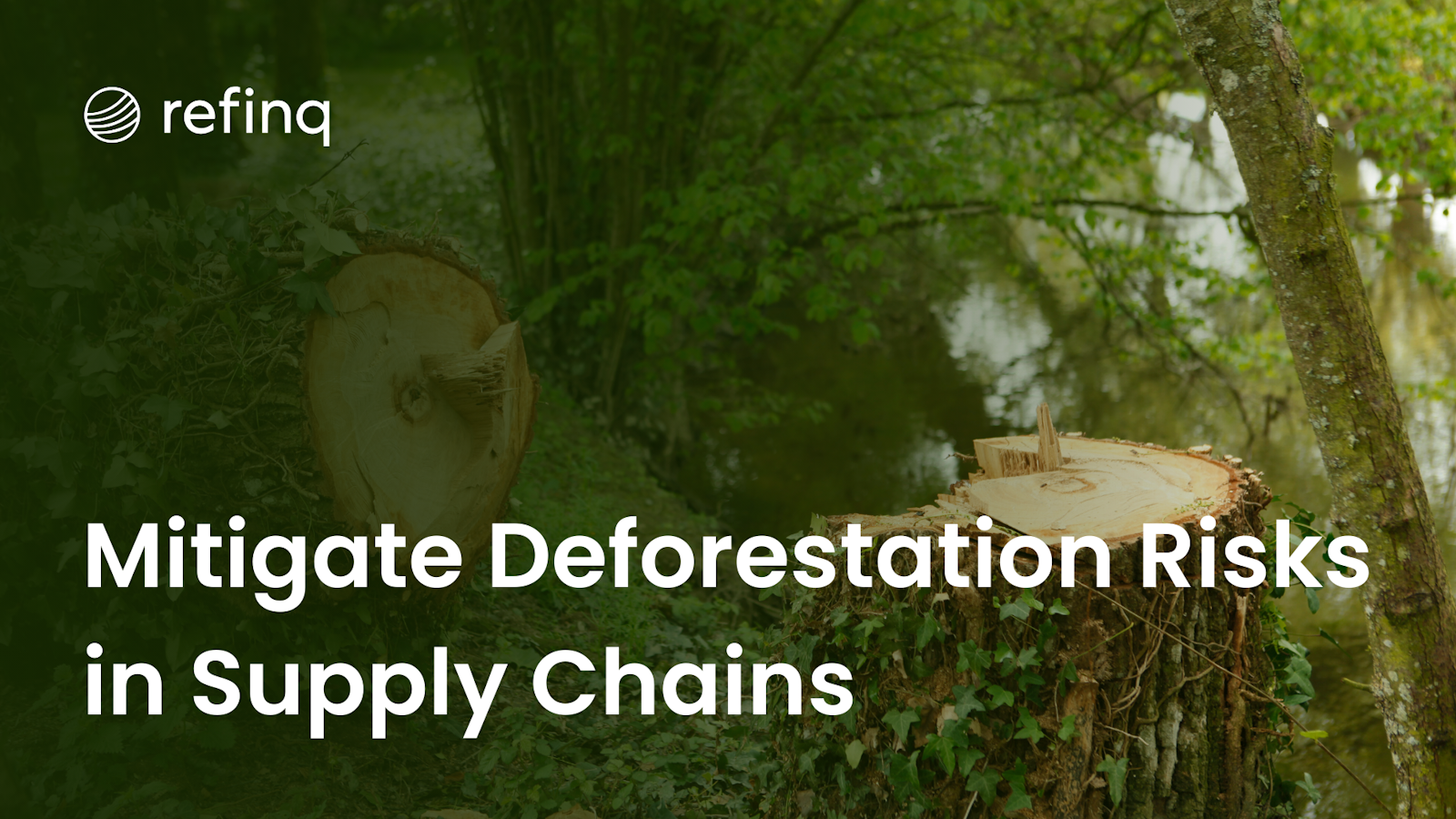

Understanding Deforestation Risks in Supply Chains
Deforestation, the large-scale removal of forested areas, poses significant risks to global supply chains. Companies reliant on natural resources for raw materials, such as timber, palm oil, and soy, face growing challenges as deforestation increases in many regions. The environmental and ethical implications of deforestation are profound, and its impacts extend to businesses through resource scarcity, reputational risks, and regulatory pressures. Deforestation-free supply chains are essential for businesses aiming to maintain sustainability and resilience in their operations. (Learn more about addressing deforestation).
In addition to environmental consequences, deforestation creates business risks that can disrupt supply chains and tarnish brand reputations. Consumers are increasingly conscious of ethical practices, and companies linked to deforestation risk losing customer trust. Regulatory changes are also underway, with frameworks requiring transparent sourcing practices and deforestation-free pledges. By addressing deforestation risks, businesses can protect their supply chains, enhance resilience, and meet evolving regulatory demands.
To mitigate deforestation risks, companies must first identify where deforestation impacts their supply chains. Methods to assess deforestation risks include:
Geospatial Monitoring: Using satellite imagery and geospatial data allows companies to monitor deforestation in supplier regions.
Risk Assessment Platforms: Platforms like refinq offer comprehensive climate and biodiversity risk assessments, enabling companies to evaluate deforestation impacts at a granular level. refinq integrates extensive data to create detailed risk profiles, assisting companies in identifying and addressing high-risk areas within their supply chains.
Effective Strategies for Mitigating Deforestation in Supply Chains
Implementing Sustainable Sourcing Policies
To combat deforestation, companies should adopt sustainable sourcing policies that prioritize deforestation-free suppliers. This involves establishing clear guidelines for vendors, favoring materials certified by organizations such as the Forest Stewardship Council (FSC), and encouraging suppliers to adopt environmentally responsible practices.
Strengthening Supplier Accountability
Effective deforestation mitigation requires a strong commitment to supplier accountability. Businesses should require suppliers to comply with sustainability standards, conduct regular audits, and implement penalties for non-compliance. By enhancing accountability, companies can reduce the risk of deforestation in their supply chains.
Using Technology for Traceability
Traceability technology, including blockchain and geospatial monitoring, allows companies to track the origin of raw materials and ensure compliance with deforestation-free policies. By integrating traceability tools, companies can identify deforestation hotspots and verify sustainable practices among suppliers (Explore supply chain traceability solutions).
Collaborating with Environmental Organizations
Collaboration with environmental organizations and conservation groups can support sustainable supply chain practices. These partnerships provide access to resources, data, and best practices for reducing deforestation, and they enhance companies' environmental credibility.
Incorporating Risk Assessments in Business Strategy
Advanced platforms like refinq empower companies to assess deforestation and climate risks effectively. refinq processes billions of data points from earth observation and climate models, enabling businesses to evaluate biodiversity impacts across global locations. This capability is essential for companies seeking to monitor and manage deforestation risks comprehensively (Learn about refinq’s risk assessment solutions).
Where Are the Effects of Deforestation Most Visible in Supply Chains?
Deforestation is particularly impactful in industries dependent on forest resources or agriculture. Key sectors affected include:
Agriculture: Sectors relying on commodities like palm oil, soy, and cattle are highly susceptible to deforestation impacts.
Forestry and Paper: Companies in the timber and paper industries must take active steps to source materials sustainably, given the high environmental cost of deforestation.
Retail: Brands with complex supply chains, such as apparel, often depend indirectly on agricultural resources, making deforestation mitigation essential to maintain sustainable business practices.
Successfully implementing anti-deforestation strategies involves multiple stakeholders:
Corporate Leaders and Decision-Makers: Executives play a crucial role in defining sustainability policies and allocating resources to ensure deforestation-free supply chains.
Supply Chain Managers: These professionals are responsible for monitoring suppliers, enforcing compliance, and managing risk assessments.
Environmental Compliance Teams: Dedicated teams or consultants oversee adherence to environmental standards and frameworks, ensuring that the company remains compliant with global regulations.
Where Can Companies Source Sustainable Materials to Prevent Deforestation?
Companies looking to prevent deforestation can source sustainable materials through certified suppliers:
Certified Wood and Paper: Sourcing wood and paper products certified by the Forest Stewardship Council (FSC) or the Programme for the Endorsement of Forest Certification (PEFC) supports sustainable forestry.
Responsible Agricultural Commodities: Sustainable sources for palm oil, soy, and cocoa, certified by bodies like the Roundtable on Sustainable Palm Oil (RSPO), help minimize deforestation impacts.
Ethical Partnerships: Partnering with sustainable material providers ensures transparency and reduces deforestation risks across supply chains (Explore sustainable sourcing practices).
refinq: A Solution for Managing Deforestation Risks
refinq is an advanced SaaS platform designed to help businesses mitigate environmental risks, including deforestation, in their supply chains. By leveraging machine learning, geospatial analysis, and over 2.5 billion data points, refinq provides real-time risk evaluations, offering a high level of data granularity to monitor deforestation-prone areas. Companies can use refinq’s insights to prioritize actions that reduce environmental impacts, ensuring regulatory compliance with frameworks such as the Taskforce on Nature-related Financial Disclosures (TNFD) and the Corporate Sustainability Reporting Standard (CSRD).
With tools tailored for biodiversity risk assessment, refinq aids companies in evaluating suppliers, monitoring supply chain impacts, and building resilience against deforestation risks. This platform’s compliance-oriented reporting helps businesses align their operations with international sustainability goals, ultimately promoting a sustainable and deforestation-free supply chain. (Explore refinq’s biodiversity solutions).
Conclusion: Building a Sustainable, Deforestation-Free Supply Chain
By adopting proactive strategies, businesses can mitigate the risks associated with deforestation and build more resilient supply chains. Approaches like sustainable sourcing, supplier accountability, and advanced monitoring tools are crucial for businesses aiming to protect both their operations and the environment. Platforms like refinq provide essential insights and tools to enable companies to manage deforestation risks, ensure compliance, and maintain their commitment to sustainability.
Relevant Links
World Economic Forum - How to Build Deforestation-Free Supply Chains
Accountability Framework - From Commitments to Action at Scale